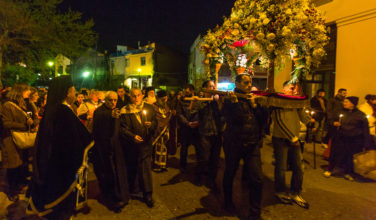What Does “Christos Anesti” Mean?
Comments Off on What Does “Christos Anesti” Mean?
 During Easter, there are some typical greetings that Greek Orthodox Christians say to one another. These greetings are said after the Saturday evening and early Sunday morning church service. During the Holy Saturday service, we essentially mourn Christ’s death. During the portion of the service that takes place early on Sunday morning, we celebrate His resurrection. The greetings we say to one other reflect this celebration.
During Easter, there are some typical greetings that Greek Orthodox Christians say to one another. These greetings are said after the Saturday evening and early Sunday morning church service. During the Holy Saturday service, we essentially mourn Christ’s death. During the portion of the service that takes place early on Sunday morning, we celebrate His resurrection. The greetings we say to one other reflect this celebration.
Typical Greek Easter Greetings
Easter, or Pascha, is a time for us to celebrate Christ’s resurrection. There are a few typical things that we say to each other during this time, and we typically say them not only during Pascha, but also for forty days after it.
- Kalo Pascha (Καλό Πάσχα!) – This is the Greek equivalent of “Happy Easter”. Literally translated it means “Good Pascha” or “Good Easter”.
- Kali Anastasi (Καλή Ανάσταση) – This is what Greeks say to each other to express their joy about Christ’s resurrection. Literally translated, it means “Good Resurrection.”
- Christos Anesti (Χριστός Ανέστη) – Greeks greet each other with this starting after midnight on Easter Sunday. This phrase means, “Christ is Risen.”
- Alithos Anesti (Aληθώς ανέστη!) – This is the response to the phrase, Christos Anesti. It means, “Truly, He is Risen.” You only say this to someone who has just said, “Christos Anesti” to you.
Paschal Greetings Originate in the Bible
There isn’t much information available as to the history of these phrases other than the fact that they are mentioned in the Bible. Most Christian cultures have these phrases translated into their native languages and the phrases can be traced to various books in the New Testament. Here’s a look:
Matthew 27:64:
64Therefore command the tomb to be made secure until the third day; otherwise his disciples may go and steal him away, and tell the people, ‘He has been raised from the dead,’ and the last deception would be worse than the first.”
Matthew 28:6-7
6 He is not here; he has risen, just as he said. Come and see the place where he lay. 7 Then go quickly and tell his disciples: ‘He has risen from the dead and is going ahead of you into Galilee. There you will see him.’ Now I have told you.”
Mark 16:6
6But he said to them, “Do not be alarmed; you are looking for Jesus of Nazareth, who was crucified. He has been raised; he is not here. Look, there is the place they laid him.
Luke 24:34
34They were saying, “The Lord has risen indeed, and he has appeared to Simon!”
Christos Anesti Hymn
Finally, there is a traditional hymn that is sung in the Orthodox Church just after midnight. It is the first thing that we do in order to celebrate His resurrection. Here are the words to the hymn as they were written in Greek, and then translated to English:
Greek
Χριστὸς ἀνέστη ἐκ νεκρῶν
θανάτῳ θάνατον πατήσας
καὶ τοῖς ἐν τοῖς μνήμασι
ζωὴν χαρισάμενος.
Phonetic Greek
Christos anesti ek nekron
Thanato Thanaton patiras
Kai tis en tis mnimasi
Zoin charisamenos.
English
Chist is risen
from the dead,
and by His death
He has trampled down death.
and to those in the tomb he gave eternal life.
This hymn is sung not only during the church services on Sunday, starting in the early hours of Sunday morning, but for forty days after Pascha.
Sources:
Categorized in: Greek Easter Traditions
This post was written by Greek Boston
Share this Article:





